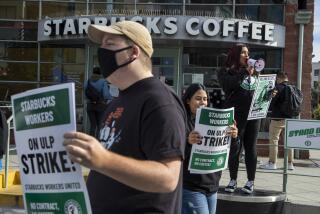Court Bars Disclosure by Media
- Share via
EAGLE, Colo. — The Colorado Supreme Court narrowly supported the trial judge in the Kobe Bryant sexual assault case Monday, ruling that the media cannot publish accidentally released details from a closed-door hearing.
The majority opinion, written by Justice Gregory Hobbs, said that Colorado’s rape-shield law and the accuser’s privacy prevail over the media’s 1st Amendment rights to publish the material.
Seven news organizations, including The Times, received e-mailed transcripts of a two-day hearing last month from a court reporter who was attempting to send the material to attorneys in the case.
District Judge Terry Ruckriegle issued an order the same day the transcripts were sent, threatening to cite anyone who released the information with contempt. The news organizations have withheld publishing the material while their attorneys fight the order.
Attorneys for the news organizations said they would appeal the ruling to the U.S. Supreme Court.
In addition, media organizations across the country are joining to file a brief in support of the seven organizations, which also include Associated Press, the Denver Post, CBS, ESPN, Fox News and the television show “Celebrity Justice.”
“This is a court order prohibiting publication,” said Erwin Chemerinsky, a USC constitutional law professor. “Unless the Supreme Court dramatically changes the law of the 1st Amendment, this decision can’t stand.”
The transcripts were from a hearing that addressed evidence the defense argues should be an exception to the rape-shield law. They included extensive testimony from a DNA expert hired by Bryant regarding the sexual conduct of his accuser in the days surrounding the alleged rape on June 30, 2003.
It has been established in open court and in written pleadings that the defense has presented evidence that semen and sperm from a man other than Bryant were found on swabs taken from the woman July 1, 2003, at her medical examination.
The Colorado Supreme Court, in a 4-3 decision, said that although Ruckriegle’s order is a prior restraint of the media usually barred by the Constitution, it should be allowed to stand because of the importance of keeping rape-shield evidence confidential unless the judge determines it is relevant to the case.
The order “is necessary to protect against an evil that is great and certain and would result from the reportage,” the state high court said.
The state high court justices urged Ruckriegle to make the rape-shield rulings as soon as possible and to determine whether any part of the transcripts are relevant to the case and therefore admissible at trial. They also suggested that the judge release a version of the transcripts with inadmissible portions blacked out.
The error was made by court reporter Michelle Goodbee, who said she intended to e-mail the transcripts to Ruckriegle and attorneys in the case, but instead sent them to a list of news organizations that had previously requested records of open proceedings. The mistake prompted an attorney for the accuser to ask Ruckriegle that the court cease all electronic dissemination of filings.
Dissenting justices said the media should not be held responsible if the court failed to protect confidential material. Furthermore, they said, much of the information in the transcripts already has been reported.
“The power the majority authorizes is the power of the government to censor the media, which is precisely the power the 1st Amendment prohibits,” Justice Michael Bender wrote.
Chemerinsky said the ruling flies in the face of a long line of U.S. Supreme Court decisions going back to the landmark 1932 Near vs. Minnesota decision, prohibiting prior restraint on the publication of information. The Supreme Court barred another bid for prior restraint in 1971, when it ruled the Nixon administration could not prohibit the New York Times and other newspapers from publishing the Pentagon Papers.
In a 1989 ruling emanating from a Florida case, the high court ruled that a newspaper could not be held liable for damages after publishing the name of a rape victim whose identity was contained in a police report and inadvertently made available to a reporter in Jacksonville, Fla. The Supreme Court overturned a $97,500 damage judgment against the paper that had been based on a Florida law that prohibited identifying the victim of a sex crime. The high court decided that a news organization could not be held liable for publishing accurate information that it had obtained legitimately. The Supreme Court had issued a similar ruling in 1975.
Both of those cases arose in states that had rape-shield laws, Chemerinsky noted, and the same privacy interest being asserted by Bryant’s accuser was at stake in those situations.
However, Sharon Dolovich, acting professor of law at UCLA Law School, said the Colorado rape-shield law provided important safeguards, reflecting concern that jurors who hear about the sexual history of a woman in a rape prosecution may improperly rely on that information or draw inappropriate stereotypes.
“The law of rape is that if you are not consenting at the moment of the sexual act it is just as much a violation if you earlier had sex with 100 men or never had sex before,” Dolovich said. The worry, she said, is that if jurors learn about the victim’s sexual history they may improperly take it into account when deciding whether the woman consented.
Consequently, Dolovich said she thought the Colorado courts made the right decision, because it will help ensure a fair trial while not impeding media interests in a significant way.
“This information can be published after the trial,” she said. “I can’t imagine how the media’s interest exceeds the interest in a fair trial.”
Victims’ rights advocates hailed the ruling.
“It balances the 1st Amendment rights with individual privacy rights of the victim,” said Cynthia Stone, spokeswoman for the Colorado Coalition Against Sexual Assault. “Anything the judge deems relevant will eventually be in the public domain.”
Bryant, 25, has pleaded not guilty to raping the woman, then 19, at a mountain resort. He has said he had consensual sex with the woman. If convicted, the basketball star faces four years to life in prison or 20 years to life on probation, and a fine up to $750,000.
*
Henson reported from Eagle, Colo., Weinstein from Los Angeles.
More to Read
Sign up for Essential California
The most important California stories and recommendations in your inbox every morning.
You may occasionally receive promotional content from the Los Angeles Times.














